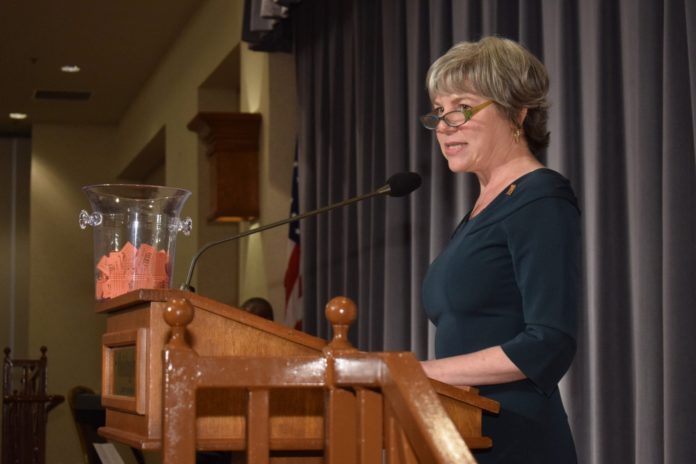Rhodes College’s new president, Dr. Marjorie Hass, is the 2018 Race for the Cure honorary chairperson. Last Saturday at the Holiday Inn-University of Memphis, she shared her story of dealing with breast cancer during the 2018 Susan G. Komen Memphis-MidSouth Mississippi Survivor & Those Living With MBC Luncheon.
This is what she said:
“Depending on who you talk to, I am either a very unlucky woman. Or a very lucky one.
“Unlucky to have developed breast cancer at 52. Unlucky to have had an aggressive form of it. Unlucky to have needed chemotherapy. Unlucky that this all happened just after I had accepted a new job in the midst of moving my family across the country. Unlucky that my mom was diagnosed with breast cancer three weeks after I was.
“But also, I am oh so lucky.
“Lucky I found the lump. Lucky it was caught early. Lucky it hadn’t yet spread. Lucky my mom asked for three-D imaging for herself because of my recent diagnosis. Lucky my mom and I don’t carry the BRCA gene even though we are Jewish. Lucky to have good health insurance and a loving family. Lucky to have had the money to pay for the things my family needed while I was in treatment. Lucky to have a career that allowed me time off for treatment. Lucky that breast cancer research has been well-funded so that a cure was available when I needed it.
“We don’t talk a lot about luck in America. We like to believe that happiness and unhappiness are somehow controllable and meted out based on merit and what we deserve.
“And even within the supportive world of pink ribbons and survivors, we sometimes speak as though individual courage or a positive attitude determines a woman’s outcome.
“But the reasons I can stand before you today – cancer-free and with regained vitality – is not the result of my character or my moral worth.
“Yes, I was pretty plucky and I do try to be a nice person. But without the lucky breaks that allowed me to access treatment, my story would not have been so happy.
“The Komen race, and the money it raises levels the playing field for a lot of women. It makes up in resources what the luck of the draw might not provide. It makes sure that no woman has to put off a mammogram because she isn’t insured or she can’t afford it. It makes sure that every woman has someone to talk to and to help her understand her options. It makes sure that research keeps advancing so that fewer and fewer women are unlucky enough to run out of treatment options.
“In the wake of my diagnosis, treatment, and recovery, it feels important to me to support these efforts.
“Everyone touched by breast cancer has a unique story – her own combination of lucky and unlucky factors, along with the deeply personal and creative way that she has made meaning out of this terrible disease. My hope is that we can make room for the entire tapestry of stories—opening our ears and hearts even to tales with unhappy endings or with uncomfortable lessons. Those of us in remission can, and should, celebrate with gratitude. But I hope we can do so while also recognizing how unevenly luck gets spread around.
“I am grateful for the Komen Foundation, for the donors, and for the health care professionals who translate Komen funding into patient care. And I am grateful to be in this room, in this moment, and in restored health.
“In my tradition, we make a blessing on such occasions and I would like to say it here. Shehekianu.”



